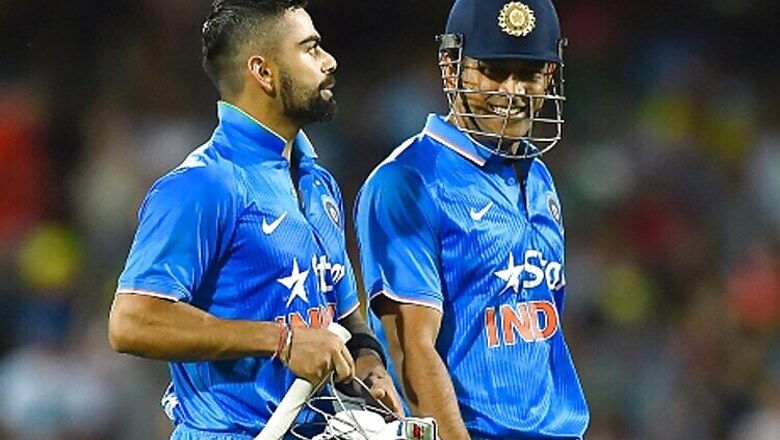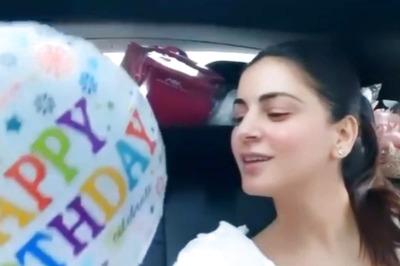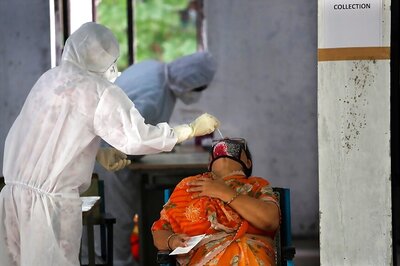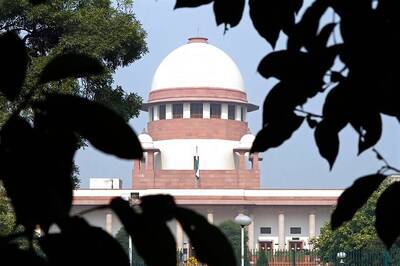
views
Here are some important reports from the biggest newspapers of India:
1. Kohli's bat scores on ads too, earns Rs 2 crore more than MSD's
India's ODI and T20 cricket captain MS Dhoni continues to be one of the highest paid brand endorsers in the country. But when it comes to peddling the willow, red hot Virat Kohli commands a higher price, said a report in The Times of India.
While Dhoni gets around Rs 6 crore to put a Spartan sticker on his bat, Test captain Kohli, who uses an MRF bat, gets around Rs 8 crore for the same, said people familiar with the matter.
The Delhi batter also gets paid around Rs 2 crore for endorsing apparel and shoes on the pitch.
2. Atal era better than Modi's: BJP papers
At the national executive, the BJP leadership exhorted party cadres to spread the achievements of the Narendra Modi regime far and wide, but the fact remains that the institutional mechanism of internal dialogue with party cadres seems to have shrunk when compared with the Vajpayee regime.
A comparison of the frequency of the party's national meets during the first two years of full terms of the Vajpayee regime (October 1999-May 2004) and Modi regime (May 2014 onwards) suggests that the party constitution was followed with sincerity during the previous NDA regime.
In fact, BJP's official records clearly re flect that while there were six national meets during late 1999 and end 2001 (first two years) after Vajpayee got reelected as the PM for a full term, there has been only three such meets during the first two years of the Modi regime, reported The Economic Times.
3. Maoists use lottery to pick child soldiers
Paru Majhi, 38, crouches restlessly along with other villagers at a CPI Maoists' den in his village, Jamti, a tribal hamlet around 200km from Ranchi, on March 14.
An armed gunman walks towards a brass pot and fishes out a paper chit from it. For a few seconds, the villagers' heart beats stop. "It's Paru's daughter Sheela (name changed)," announces the militant.
Maoists have taken to holding public lotteries to draft children into the force. This new strategy by rebels is aimed at augmenting dwindling numbers and armed strength to fight against a ferocious onslaught by state security forces, said a report in Hindustan Times.
4. 10% of users cause 90% of trouble, toll operators complain to NHAI
Members of Parliament not paying toll on highways may be making headlines, but toll operators are more worried about local government and police officers who demand free passage through plazas and even issue arbitrary circulars for exemptions to locals.
Operators from across the country raised the issue while participating in a discussion at National Highways Authority of India (NHAI) headquarters on Friday.
Some of the operators even asked the government to consider making non-payment of toll a "cognisable offence". They admitted that while barely 10% of users don't want to pay toll and ar gue with booth attendants this minority accounts for 90% of their problems, reported The Times of India.
5. 'Miracle drug' for resistant TB to be rolled out for trial today
A 'miracle drug' to battle multi-drug resistant tuberculosis MDR-TB, and extensively drug resistant TB (XDRTB), will be rolled out on Monday in six public hospitals across the country.
This is part of a co-ordinated programme between the government and Johnson & Johnson, whose pharma arm Janssen has manufactured the drug.
Named 'Bedaquiline' (trade name Sirturo), the drug is perhaps the first in decades to have a potential to dramatically improve MDR-TB treatment outcomes, and reduce the number of people who die from the disease, reported The Times of India.
6. Kid gets locked in car seized by cops in Mumbai, dies
A four-year-old boy suffocated to death after he ac cidently locked himself in a seized stolen vehicle parked by the crime branch outside his house at Damodar Park in Ghatkopar, Mumbai.
The Mumbai police have registered an accidental death report and are probing the cause of death.
"Due to a space crunch, the Mumbai police do not have a proper place to park seized stolen vehicles and hence had kept them at an un der-construction site, where children from the vicinity play," a police official told The Times of India.
7. Saharanpur stands up for brothers at centre of storm in South Africa
Over the weekend, as the ruling African National Congress (ANC) in South Africa went into a huddle, rocked by allegations of unethical links between President Jacob Zuma and a business empire owned by three Indian brothers, echoes of that storm were heard thousands of kilometres away — in UP's Saharanpur, their hometown.
On Sunday night, the Guptas, who are involved in mining, media and aviation in South Africa, appeared to have weathered the storm with the ANC officially reposing its faith in Zuma, said a report in The Indian Express.
According to their friends and relatives in Saharanpur, the allegations were part of a "political vendetta" against the family.
8. Atomic material smuggling racket busted, Rajasthan ATS arrests six
An anonymous tip-off has helped the Department of Atomic Energy (DAE), Intelligence Bureau and Rajasthan Police's Anti-Terrorism Squad (ATS) join hands to bust a mineral smuggling racket that involved exports of beryl — an atomic mineral ore of Beryllium — to China.
About 31 tonnes of beryl is learnt to have been recovered after the smuggling plan was subverted by the DAE, which received information on the illegal export of beryl through the anonymous letter early in January.
Following this, the IB was alerted, reported The Indian Express.
9. 'Insult to RSS chief': Cops in a fix after booking youth under scrapped 66(A) of IT Act
More than four months after the arrest of a Muslim youth for allegedly posting an offensive comment against RSS chief Mohan Bhagwat on Facebook, the Sheopur Police in Madhya Pradesh have no idea how to submit the chargesheet, reported The Indian Express.
Reason: The police had booked him under Section 66 (A) of the IT Act, which was scrapped by the Supreme Court months ago. Sattar Khan, 25, was arrested from Balapura locality of Sheopur town for his Facebook comment on November 2, 2015.
He was later released on bail.
10. India Inc role to begin at planning level
India's new policy on defence procurement is heavy on industry involvement from roping in private sector companies from the feasibility stage itself to hiring professionals to draft tenders and starting off with a preamble that describes 'Make in India' as the focal point.
Manohar Parrikar's ministry is finalising the defence procurement policy that is likely to be released at the end of this month and a draft copy accessed by The Economic Times reveals heavy emphasis on involving the industry and a focus on enhancing the role of MSMEs.
Changes include the introduction of a preamble that will be the 'guide' for all decisions, new categories for procurement to prioritise locally developed equipment and deep interaction with the industry at every stage of procurement.



















Comments
0 comment